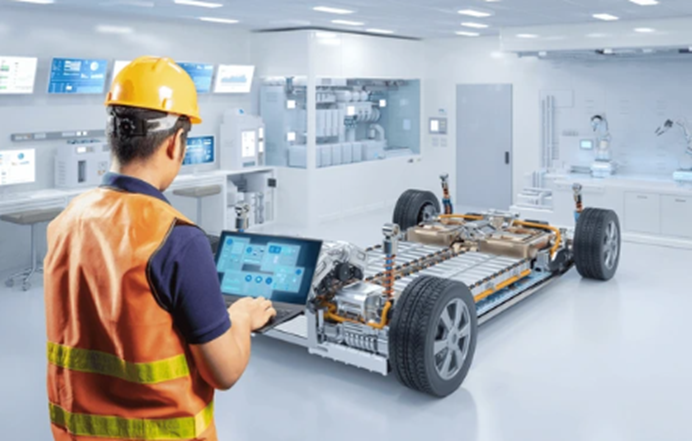The Center for Renewable Energy Infrastructure Training and Innovation (CREITI)
The Center for Renewable Energy Infrastructure Training and Innovation provides a skills development educational experience in renewable energy implementation training across electric vehicle charging stations and infrastructure, solar energy PV panel installation, smart building technology, and research and development for the exploration of new ideas that improve processes that help us to design a better planet.
CREITI views innovation as an engine of evolution to transform ideas into efficient new technological developments, not only as a differentiating factor, but also as an intrinsic part of creating sustainable solutions that respond to major global challenges and helps to build a sustainable future.
We channel the innovation processes through renewable energies, which act as a platform for the development of business activities and new technological solutions through research in solar, electric vehicle charging, electric battery storage, green hydrogen, grid integration of solar and hydro technologies.
Courses Offered
Electric Vehicle Charging Stations and Infrastructure
The National Electric Vehicle Infrastructure (NEVI) program will soon have a comprehensive network of 500,000 chargers across the country that will allow EV drivers to travel to any destination on America’s highway system.
The Electric Vehicle Infrastructure Training Program (EVITP) has rigorous instruction and training standards. Appropriate entry requirements, expert instruction, a comprehensive and regularly updated curriculum with a demanding final exam ensures strong comprehension, performance, and consistent training results. Participants will be eligible for Certification at the satisfactory completion of the course.

Course Overview:
- EV prospect/customer relations and experience
- Automobile manufacturer’s charging performance integrity specifications
- EV battery types, specifications, and charging characteristics
- Utility interconnect policies and requirements
- Utility grid stress precautions including demand response integration technologies
- Role of electrical storage devices as charging intermediaries
- Installing, commissioning, and maintaining electric storage devices
- Charging station fundamentals including brand/model-specific installation instructions for:
- Level 1: 120 VAC 15 amps
- Level 2: 120-240 VAC 60 amps
- Level 3: 480 VAC 125 amps or 600 VDC 550 amps
- Leve 4: DC Ultra Fast Chargers
- Service-level assessments and upgrade implementation
- Integration of electric vehicle infrastructure with distributed generation
- Understanding Internet Protocol (IP) networking of charging stations
- National Electrical Code (NEC) standards and requirements
- National Fire Protection Association (NFPA) 70E and OSHA regulations
- National Electrical Installation Standards (NEIS) for electric vehicle equipment
- First responder safety and fire hazard measures
- Next Generation Charging
- EVSE Troubleshooting, Repair and Commissioning
Comprising 120 clock-hours, this program includes the following six modules:
- Photovoltaic fundamentals – Students in this module will learn about performing hazard analysis, identifying job site hazards, implementing ladder safety, implementing fall protection plans, and understanding the fundamentals of electric utility system operations, among others.
- Photovoltaic system design – This includes understanding basic electrical parameters such as electrical charge, voltage, current, resistance, and power, identifying electrical test equipment, performing site analysis, designing rooftop photovoltaic solar systems, and performing system sizing.
- Photovoltaic grid-tie systems – The objectives for this module include performing the installation of a rooftop grid-tied system, understanding the requirements for roofing systems, and comparing and contrasting the benefits and features of different photovoltaic arrays mounting systems.
- Photovoltaic stand-alone systems – This involves installing a stand-alone system, understanding the operation of batteries, and identifying the requirements for charge controller installations and applications.
- Photovoltaic construction management – This construction project management module involves performing a survey, preparing a proposal, plan an installation, and identifying safety practices.
- Photovoltaic system interconnection – The final module in this program includes identifying code requirements, identifying all required tests, identifying all required inspections, and understanding the maintenance and operations of a photovoltaic solar system.
Students are prepared to enter the workforce immediately after graduation and support engineers and other professionals in installing photovoltaic systems.
Solar Installation and Maintenance Training Program
The Center for Renewable Energy Infrastructure Training and Innovation (CREITI) offers solar training for installers, designers, salespeople, and electrical professionals. Our solar installation training courses are design to guide participants as they prepare for a job in solar energy—-from the theory and science behind photovoltaics through the advanced skills needed to safely and effectively design, size and install a full solar PV array. Courses are offered in live classroom settings.
CREITI offers a certification program for solar energy technicians that is 6 weeks in length. Students learn how to apply basic engineering principles and technical skills in a hybrid laboratory and classroom environment. They also learn about solar energy principles, inspection and testing procedures, energy storage and transfer technologies, report preparation, and system maintenance procedures.


Smart Building Technology Program
This 100-hour program will equip you with Smart Building Technology and Energy Efficiency knowledge and skills. Learn the technology that’s shaping the future.
Topics Include:
- Residential & Commercial Energy Efficiency: Discover how buildings are becoming smarter and more energy-efficient and learn about energysaving practices.
- Building Optimization Skills: Learn how buildings are optimized for better performance and energy-saving operations.
- Building Automation Systems: Understand controllers and the software that controls modern building automation systems.
Certifications include:
- Building Performance Institute (BPI): Building Science Principles
- Building Operator Certification® (BOC): Fundamentals of Energy Efficient Building Operations
- US Green Building Council –Green Professional (GPRO): Operations & Maintenance
